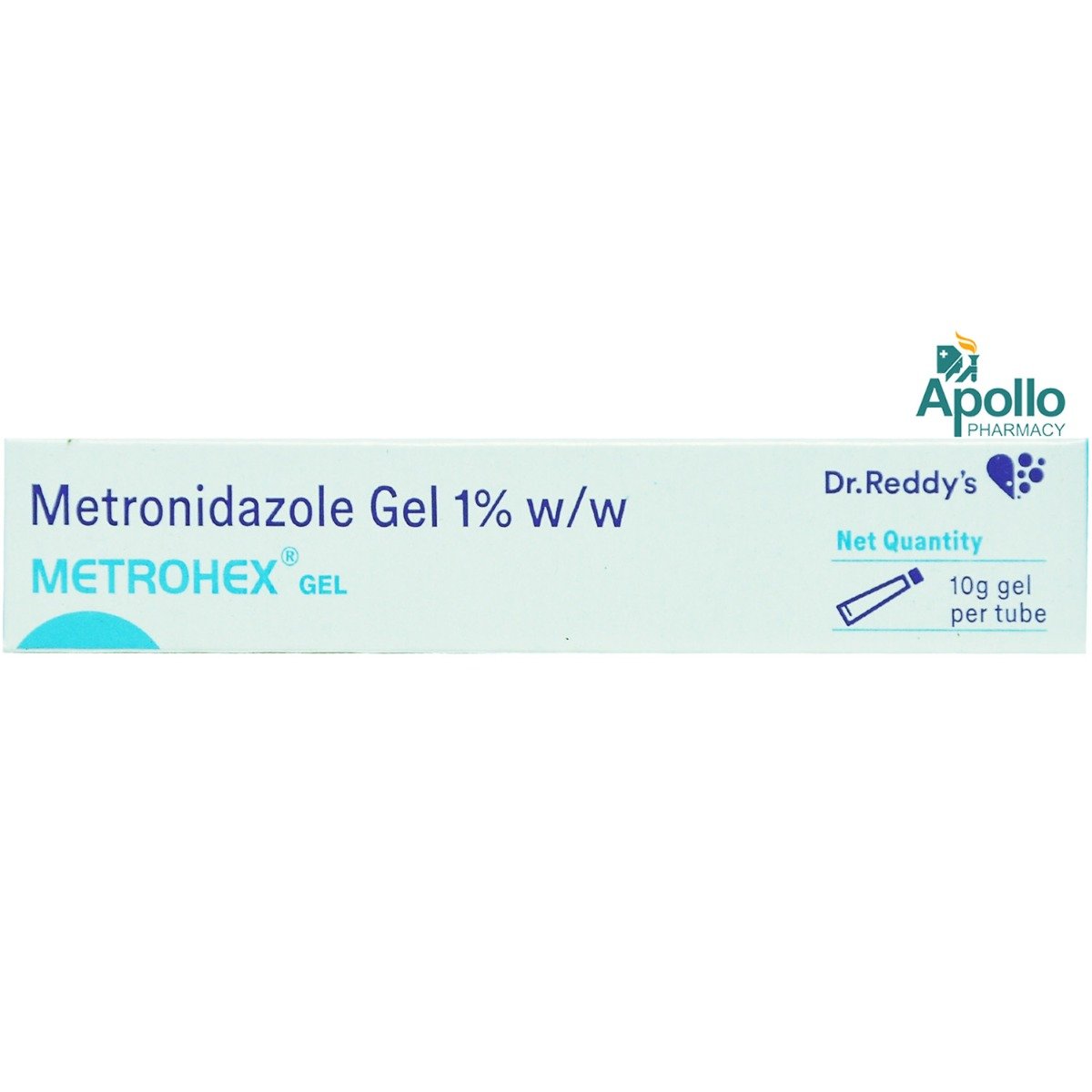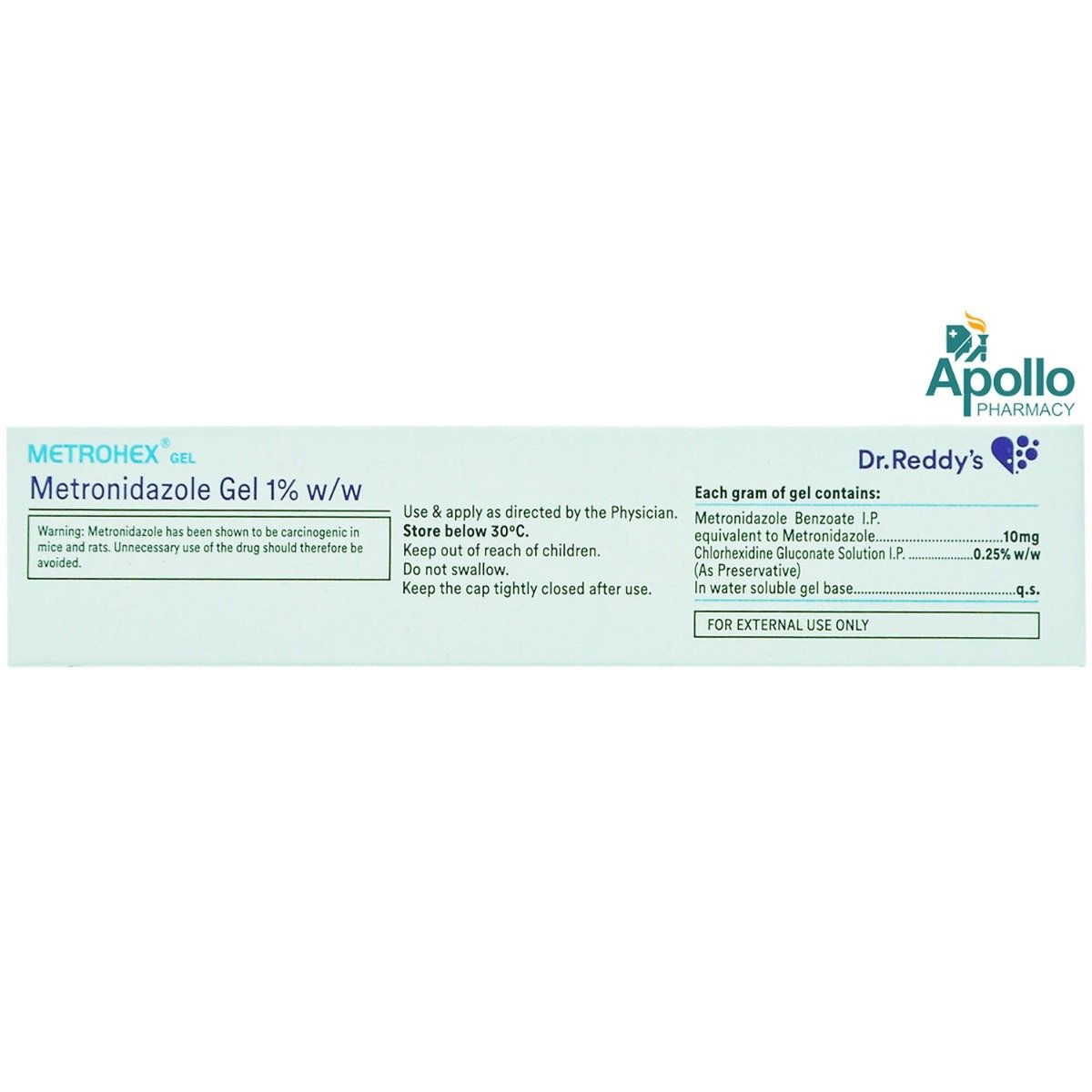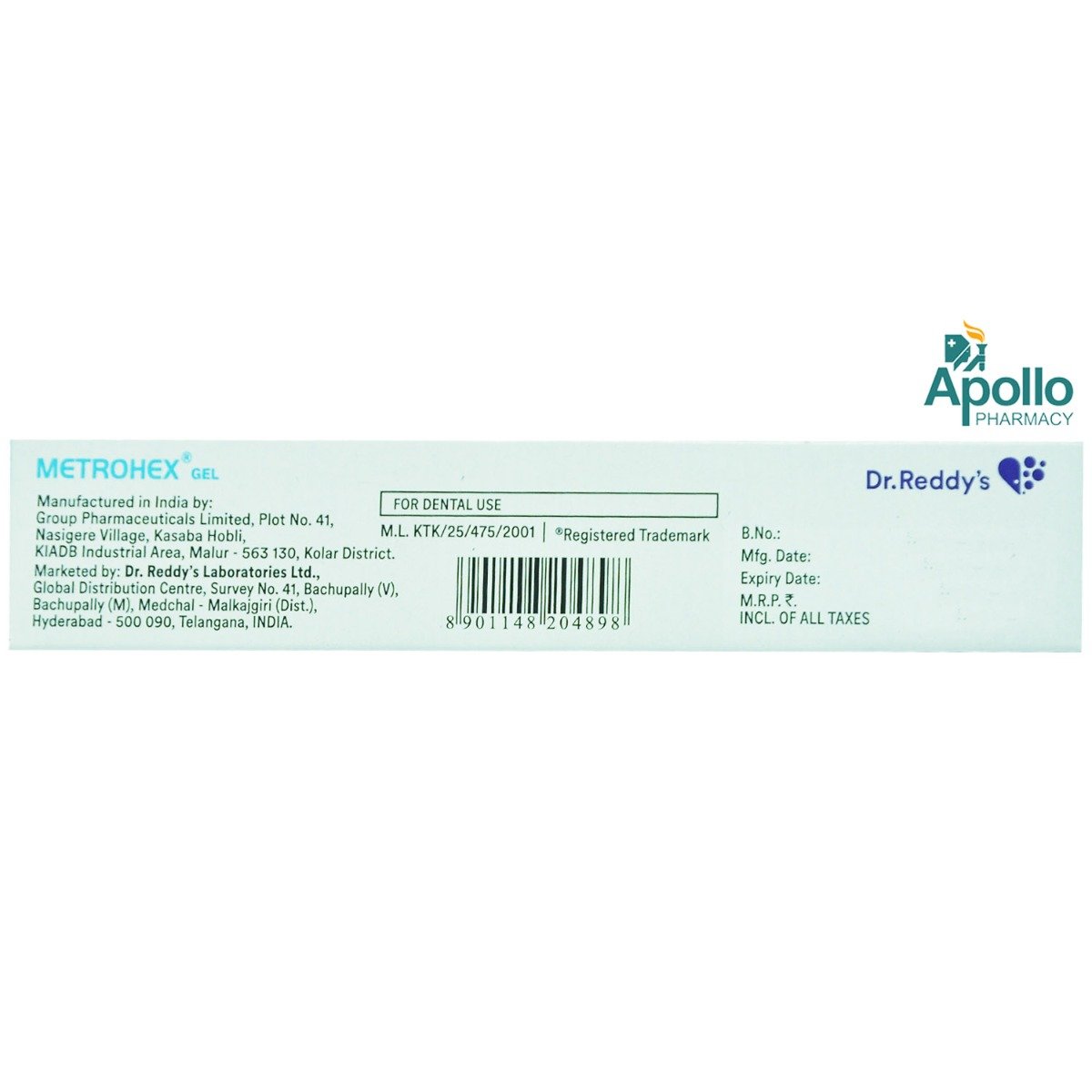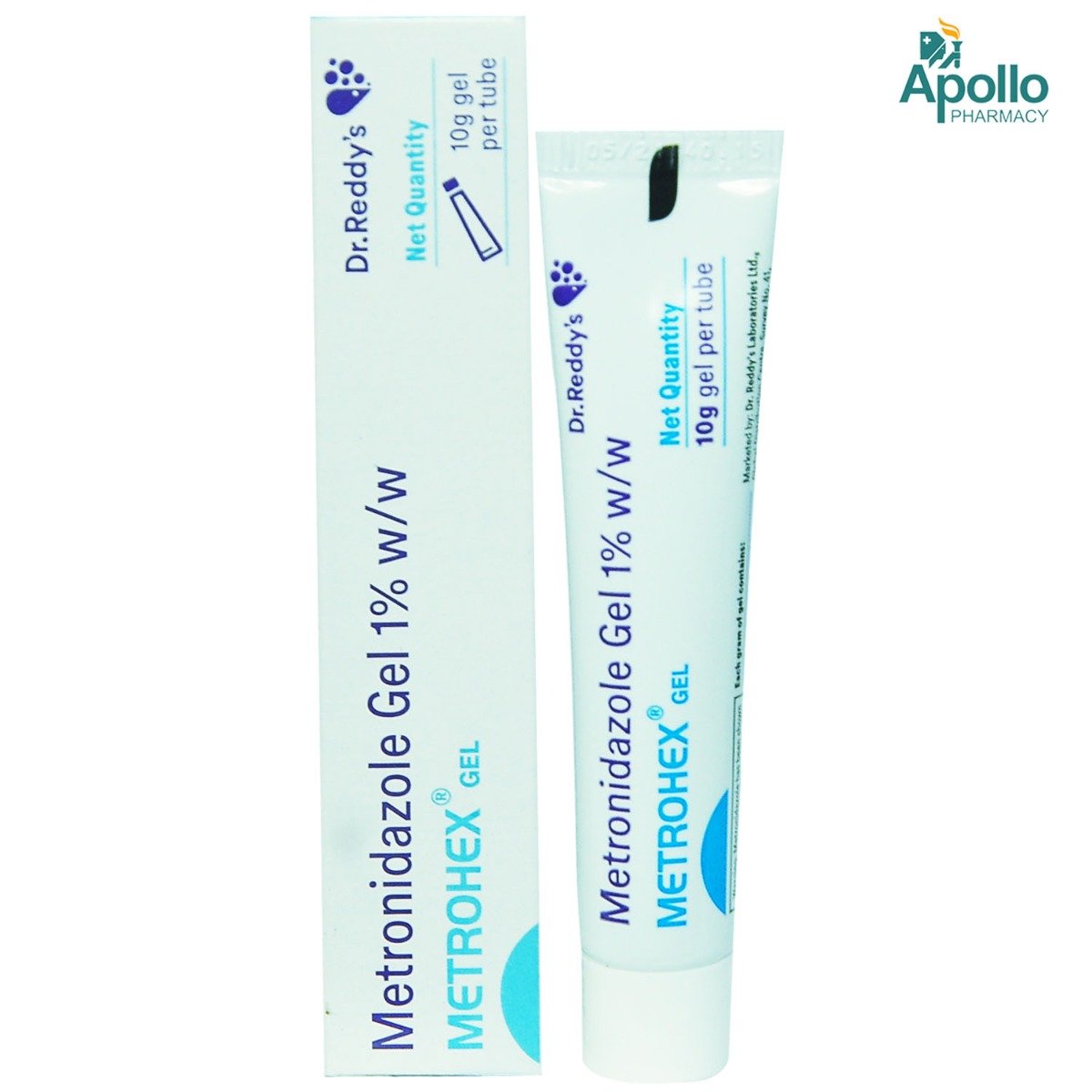Metrohex Gel 10 gm








MRP ₹95
(Inclusive of all Taxes)
₹14.3 Cashback (15%)
Provide Delivery Location
Online payment accepted
 Prescription drug
Prescription drugWhats That
Composition :
Manufacturer/Marketer :
Consume Type :
Return Policy :
Expires on or after :
About Metrohex Gel
Metrohex Gel belongs to a group of medicines known as anti-microbial agents used to treat bacterial infections of the blood, brain, lung, bone, pelvic area, stomach lining, intestines, gum, teeth, following childbirth or wound infection following an operation. It is also used to treat infected leg ulcers, pressure sores, stomach ulcers caused by Helicobacter pylori, urinary or genital infections caused by Trichomonas parasite, amoebiasis (parasitic infection of the colon), and to prevent infections after surgery.
Metrohex Gel contains metronidazole that works by preventing the production of proteins required by the harmful microorganisms for their survival. Thereby Metrohex Gel treats bacterial and parasitic infections.
Your doctor will decide the duration depending on the type of infection. Some common side effects of Metrohex Gel are nausea, vomiting, upset stomach, loss of appetite, dry mouth, and metallic taste. Most of these side effects do not require medical attention and resolve over time. However, if the side effects persist or worsen, consult a doctor.
Metrohex Gel should not be used during pregnancy, especially during the first trimester and while breastfeeding. Do not drive or operate heavy machinery after taking Metrohex Gel as it may cause dizziness and drowsiness. Avoid consumption of alcohol while on treatment with Metrohex Gel and for 48 hours after completing the course as it may cause unpleasant side effects. Keep your doctor informed about your health condition and medications to rule out any side effects.
Uses of Metrohex Gel
Directions for Use
Medicinal Benefits
Metrohex Gel contains metronidazole used to treat and prevent bacterial and parasitic infections including blood, brain, bone, lung, stomach lining, pelvic area and genital infections, amoebiasis, gum and teeth infections, infected leg ulcers or pressure sores, stomach ulcers caused by Helicobacter pylori, urinary or genital infections caused by Trichomonas parasite. Furthermore, it can also be used to treat infections following childbirth or in a wound following an operation. It works by preventing the infection-causing bacteria or parasites from growing.
Storage
- Moisturize frequently with thick, broad-spectrum moisturizers containing sunscreen.
- Use warm water for short baths, and gentle cleansers.
- Pat dry and apply moisturizer immediately.
- Use a humidifier to add moisture to the air, and choose breathable fabrics like cotton and silk.
- Wash clothes with fragrance-free detergents to minimize irritation.
- After taking a shower or bath, apply a moisturizer to damp skin.
- Use petroleum jelly or other thick emollients.
- Use a hypoallergenic, fragrance-free moisturizer 2 to 3 times a day or as frequently as required.
- Exfoliate your skin gently using a pumice stone or slightly abrasive sponge.
- Do not scrub your skin.
- Avoid hot showers or baths. Instead take short, warm showers or baths.
- Use mild soap or skin cleansers with added moisturizer.
- Drink lots of water.
- Use sunscreen and wear protective clothing while going out to protect yourself from sun damage.
- Report the itching to your doctor immediately; they may need to change your medication or dosage.
- Use a cool, damp cloth on the itchy area to help soothe and calm the skin, reducing itching and inflammation.
- Keep your skin hydrated and healthy with gentle, fragrance-free moisturizers.
- Try not to scratch, as this can worsen the itching and irritate your skin.
- If your doctor prescribes, you can take oral medications or apply topical creams or ointments to help relieve itching.
- Track your itching symptoms and follow your doctor's guidance to adjust your treatment plan if needed. If the itching persists, consult your doctor for further advice.
- If you experience burning or stinging sensations and suspect that they may be related to medication, consult a doctor or healthcare expert to determine the cause and best course of treatment.
- Avoid harsh products, extreme temperatures, and other potential irritants that may exacerbate burning or stinging.
- Your healthcare professional may recommend applying a soothing or protective agent, such as a cream, gel, or ointment, to help alleviate burning or stinging.
- Follow your healthcare professional's advice on how to care for the affected area, as gentle cleaning and care instructions may vary depending on the location and severity of the burning or stinging.
- Schedule follow-up appointments with your doctor to monitor your symptoms and adjust your treatment plan as needed. If the burning or irritation persists or worsens, seek medical attention.
- Clean the affected area with soap and water.
- Apply a cold compress on the affected area for relief.
- Avoid scratching the affected area.
- Inform your doctor about the reaction so they can adjust your treatment plan and suggest alternative medications.
- Get immediate medical attention if symptoms persist or worsen.
- Consult a healthcare professional to diagnose the skin infection and receive appropriate treatment.
- Follow your doctor's instructions for treatments including creams, ointments, or antibiotics to stop the spread of germs.
- Avoid scratching to help stop further infection and irritation.
- Particularly after handling the affected region, wash your hands frequently.
- To stop the spreading of infection, avoid sharing personal items including towels, clothes, and makeup.
- Keep your skin moist to avoid dryness and irritations.
- If your symptoms worsen or don't change, let your doctor know as they provide medical attention.
- Tell your doctor about the excessive oiliness so they can adjust your medication or offer advice.
- Your doctor may recommend alternative medications with fewer side effects on oil production.
- Wash your skin twice a day with a gentle cleanser to remove excess oil and dirt.
- Choose oil-free, non-comedogenic products to prevent clogged pores.
- Use clay masks to absorb excess oil and cleanse the skin.
Drug Warnings
Do not take Metrohex Gel if you are allergic to any of its components. Metrohex Gel should not be used during pregnancy, especially during the first trimester. So, let your doctor know if you are pregnant or planning to get pregnant. Avoid breastfeeding while taking Metrohex Gel and for 12-24 hours after completing the course. Do not drive or operate heavy machinery after taking Metrohex Gel as it may cause dizziness and drowsiness. Inform your doctor if you have Clostridium difficile-associated diarrhoea, bone marrow depression/low blood count, CNS disorder, epilepsy, porphyria (blood disorder), peripheral neuropathy, heart, kidney or liver problems.
Drug-Drug Interactions
Drug-Drug Interactions
Login/Sign Up
Drug-Food Interactions
Drug-Food Interactions
Login/Sign Up
Diet & Lifestyle Advise
- It would be best to take probiotics after taking the full course of Metrohex Gel to restore healthy bacteria in the intestine that may have been killed. Taking probiotics after antibiotic treatment can reduce the risk of antibiotic-associated diarrhoea. Certain fermented foods like yoghurt, cheese, sauerkraut and kimchi can help restore the intestine's good bacteria.
- Include more fibre-enriched food in your diet, as it can be easily digested by gut bacteria which helps stimulate their growth. Whole grains like whole-grain bread, and brown rice, should be included in the diet.
- Avoid intake of alcoholic beverages with Metrohex Gel as it can make you dehydrated and affect your sleep. This can make it harder for your body to aid Metrohex Gel in fighting off infections.
- If you have diarrhoea, drink appropriate amounts of fluids to avoid dehydration.
Side Effects of Metrohex Gel
- Nausea
- Vomiting
- Diarrhoea
- Metallic taste
Habit Forming
Therapeutic Class
All Substitutes & Brand Comparisons
RX
Metrolyn Gel 20 gm
Praise Pharma
₹121.5
(₹6.08/ 1gm)
28% CHEAPER
Product Substitutes
Drug-Diseases Interactions
Drug-Diseases Interactions
Login/Sign Up
FAQs
Metrohex Gel works by preventing the production of proteins required by the harmful microorganisms for their survival. Thereby Metrohex Gel treat and prevent bacterial and parasitic infections.
Metrohex Gel may cause jaundice in a rare case. Please consult your doctor immediately if you notice yellowing of skin and eyes.
No. You should complete the full course of Metrohex Gel as prescribed by your doctor. Consult your doctor if you experience any difficulty while taking Metrohex Gel.
No. Metrohex Gel is an antimicrobial medicine that acts only against bacterial infections and not viral infections like common cold and flu.
If you miss a dose of Metrohex Gel, take the missed dose as soon as you remember it. However, if it is almost time for the next dose, do not take a double dose to make up for a missed one.
Drug-Drug Interactions Checker List
- AMPRENAVIR
- ANISINDIONE
- DICUMAROL
- WARFARIN
- BCG VACCINE
- CHOLERA VACCINE LIVE
- TYPHOID VACCINE LIVE
- BUSULFAN
Disease/Condition Glossary
Bacterial infection: A bacterial infection is a condition in which harmful bacteria enter, multiply, and infect the body. It can target any body part and multiply very quickly. Symptoms include fever, chills, and fatigue. Bacteria are of various forms comprising commonly spherical, rod, and spiral-shaped. Anyone can become infected with a bacterial infection. But, people with a weak immune system or taking immunosuppressive medicines are more prone to bacterial infection.
Parasitic infections: Parasitic infections can result from consuming polluted water, food, or soil, coming into contact with contaminated faeces, insufficient sanitization, and poor hygiene. Symptoms include abdominal pain, diarrhoea, nausea, vomiting, gas, bloating, exhaustion, unexplained weight loss, and dysentery (bloody stools).

Have a query?
Buy best Dentistry products by
Indoco Remedies Ltd
Dr Reddy's Laboratories Ltd
Group Pharmaceuticals Ltd
Icpa Health Products Ltd
Abbott India Ltd
Mankind Pharma Pvt Ltd
Nextgen Healthcare
Vasu Organics Pvt Ltd
Leeford Healthcare Ltd
Morepen Laboratories Ltd
Stedman Pharmaceuticals Pvt Ltd
West Coast Pharmaceuticals Pvt Ltd
Macleods Pharmaceuticals Ltd
Micro Labs Ltd
Sandika Pharmaceuticals Pvt Ltd
Glenmark Pharmaceuticals Ltd
Intas Pharmaceuticals Ltd
J B Chemicals & Pharmaceuticals Ltd
Lupin Ltd
Med Manor Organics Pvt Ltd
Om Biotec
Pharmadent Remedies Pvt Ltd
Qualimed Bioscience
Wings Pharmacuticals Pvt Ltd
Across Laboratories Pvt Ltd
Agrawal Drugs Pvt Ltd
Anchal Life Science Pvt Ltd
Aureate Healthcare
Biozinik Healthcare Pvt Ltd
Chem Med Pharmaceuticals
Cipla Ltd
Dentigrity Formulations Llp
Elder Pharmaceuticals Ltd
Entod Pharmaceuticals Ltd
Fortel Life Sciences
Frimline Pvt Ltd
Galpha Laboratories Ltd
Global Dent Aids Pvt Ltd
Idem Health Products Pvt Ltd
Ipca Health Products Ltd
Ipca Laboratories Ltd
Lincoln Pharmaceuticals Ltd
Medishri Healthcare Pvt Ltd
Purexa Global Pvt Ltd
Raptakos Brett & Co Ltd
Sky Ora Care
Somatico Pharmaceuticals Ltd
Stanbac Life Sciences
Wockhardt Ltd
Aimcad Biotech Pvt Ltd
Ajanta Pharma Ltd
Alkem Laboratories Ltd
Apex Laboratories Pvt Ltd
Atopic laboratories Pvt Ltd
Ben Hadded Pharma Pvt Ltd
Bennet Pharmaceuticals Ltd
Cubit Healthcare
Daris Biocare
Dey's Medical Stores (Mfg) Ltd
Dupen Laboratories Pvt Ltd
Dwd Pharmaceuticals Ltd
Elder Projects Ltd
Fitwel Pharmaceuticals
Fourrts India Laboratories Pvt Ltd
Geno Pharmaceuticals Pvt Ltd
Graciera Pharmaceuticals Llp
Icpa Lab
Jupiter Pharmaceuticals Ltd
Karvia Laboratories Pvt Ltd
Magnum Life Sciences Pvt Ltd
Makshi Healthcare Pvt Ltd
Nexgen Healthcare Pvt Ltd
NuLife Pharmaceuticals
Panacea Biotec Ltd
Pariza Healthcare
Smart Laboratories Pvt Ltd
Suncare Formulations Pvt Ltd
Symbiosis Pharmaceuticals Pvt Ltd
U & V Cancure Pvt Ltd
Unimarck Pharma India Ltd
Unison Pharmaceuticals Pvt Ltd
Wafture Healthcare Pvt Ltd
Wembrace Biopharma Pvt Ltd
Win Medicare Ltd
Yash Pharma Laboratories Pvt Ltd
Zeelab Pharmacy Pvt Ltd
3M India Ltd
Acinom Healthcare
Admac Lifesciences(Oncology)
Adonis Laboratories Pvt Ltd
Aggarwal Chemical Works
Agim Scientific
Aksigen Hospital Care
Akumentis Healthcare Ltd
Alde Medi Impex Ltd
Alisier Drugs Pvt Ltd
Allenge India Pharma
Alniche Life Sciences Pvt Ltd
Alpinia Biopharma Pvt Ltd
American Biocare
Alcohol
Unsafe
You are recommended not to consume alcohol while on treatment with Metrohex Gel and for 48 hours after completing the course to avoid unpleasant side effects such as nausea, vomiting, stomach pain, palpitations, headache, and hot flushes.
Pregnancy
Unsafe
Metrohex Gel should not be used during pregnancy, especially during the first trimester. Inform your doctor if you are pregnant or planning for pregnancy.
Breast Feeding
Unsafe
Avoid breastfeeding while taking Metrohex Gel and for 12-24 hours after completing the course.
Driving
Caution
Metrohex Gel may cause dizziness and drowsiness; thus, avoid using machinery or driving unless you are alert.
Liver
Caution
Metrohex Gel to be taken with caution, especially if you have a history of liver diseases/conditions. Your doctor may adjust your dose depending upon your liver conditions.
Kidney
Caution
Metrohex Gel to be taken with caution, especially if you have a history of kidney diseases/conditions. Your doctor may adjust your dose depending upon your kidney conditions.
Children
Safe if prescribed
Metrohex Gel should be given to children only if prescribed by a doctor. Your doctor may adjust the dose as per the age.




